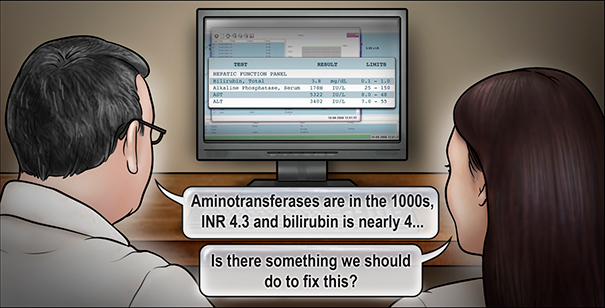In this Christmas episode of the NEJM’s evolving case series looking at common problems in critical care, we turn our attention from ventilatory stategies in ARDS to the management of acute liver failure in an elderly man admitted to the ICU with severe sepsis.

A 77-year-old man whose medical history includes treated hypertension and hypercholesterolemia, previous heavy alcohol intake, and mild cognitive impairment is admitted to the intensive care unit (ICU) of a university hospital from the operating room after resection of the rectosigmoid colon with closure of the rectal stump and formation of an end colostomy performed for fecal peritonitis due to a perforated sigmoid colon. On arrival in the ICU, he was in septic shock. He received fluid resuscitation with Hartmann’s solution and 5% human albumin solution. His blood pressure was supported with a norepinephrine infusion, and he was treated with ampicillin, amikacin, and metronidazole. He underwent mechanical ventilation with the use of a lung-protective strategy and was sedated with propofol.
The postoperative analgesia was a fentanyl infusion, with the dose adjusted by the nurses, and 1 g of intravenous acetaminophen every 6 hours.
Over the next 2 days, his condition stabilized, but on the 4th day after surgery, the alanine aminotransferase (ALT) level had increased from within the normal range (7 to 55 U per liter) at admission to 3402 U per liter, and the aspartate aminotransferase (AST) level had increased to 5322 U per liter (normal range, 8 to 48 U per liter). The international normalized ratio was 4.3, and the bilirubin level was 3.8 mg per deciliter (65 µmol per liter) (normal range, 0.1 to 1.0 mg per deciliter [1.7 to 17.0 µmol per liter]).
Which of the following strategies would you use to treat this patient’s acute liver failure?
1. Reduce the acetaminophen dose to 1 g every 12 hours and continue supportive therapy
2. Cease acetaminophen and continue supportive therapy
3. Cease acetaminophen, start treatment with acetylcysteine and continue supportive therapy
4. Continue acetaminophen, since it is probably not associated with this mans liver failure.
Once youve decided, the results can be found here.

























